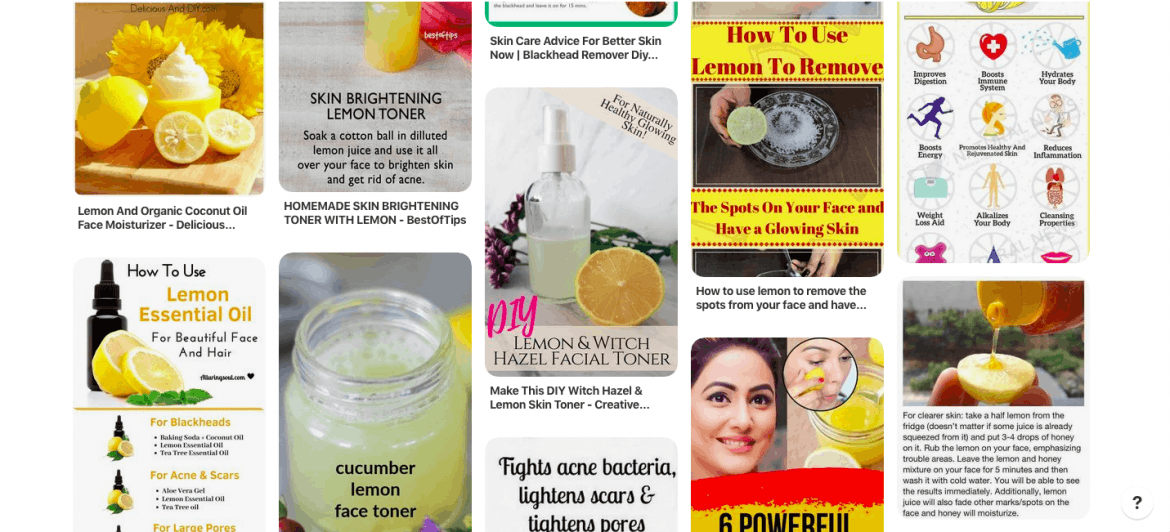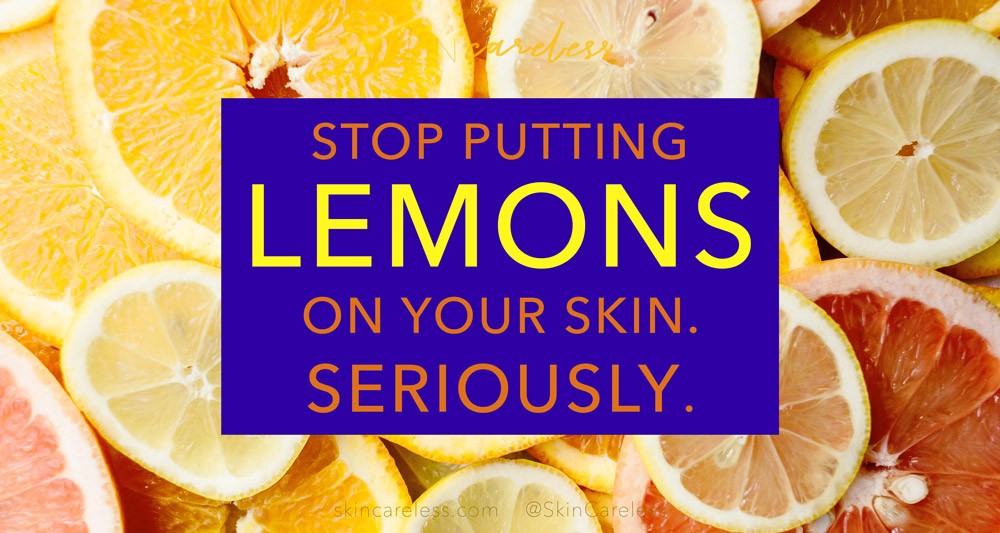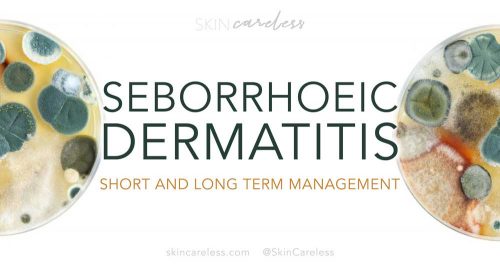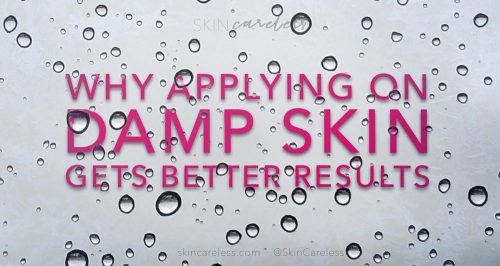Say it with me: I solemnly swear to never put lemon juice on my skin.
“Now hang on a minute,” I hear you say – “that Pinterest-famous wellness blogger/my cousin’s holistic naturopath/my friend from high school’s older sister told me it was awesome!”
Lemon juice being portrayed as a miracle skin care ingredient plagues every corner of the internet and skin care folklore.
I mean, just take a look at what comes up for the topic on Pinterest:

Let me make it very clear:
Using lemon juice on your face is a bad idea, for two very simple reasons. It doesn’t work for what people say it does, and it puts you at risk of serious skin damage.
What we’ll discuss today:
First, we’ll have a look at the lemon itself – from its properties and features, to why lemons made their way into bathroom cabinets in the first place. Then let’s move onto the claims that are floating around the internet about lemon and its apparent skin benefits. I’ll then tell you what actually happens when you use lemon juice on your skin – and it’s not pretty. After that, we’ll discuss whether these risks are worth it as compared to the underwhelming results you’ll get from a DIY lemon concoction. Finally, I’ll offer some suggestions for products you can use instead of risking it with lemon juice skin care.
The humble lemon
Lemons are everyone’s favourite summery staple and a citrus fruit, meaning it grows on a flowering tree just like grapefruit, oranges, and limes. As with all citrus fruits, the lemon is sour because of its acidity. Most sources put lemon at around a pH of 2~2.4. As pH is a logarithmic scale, that is far more acidic than it maybe seems – well over ten times more acidic than the strongest at-home acid product I’ve used.
Lemon notably contains a few ‘skin-plausible’ constituents, namely citric acid, Vitamin B and, of course, good old Vitamin C. But defining exact quantities is hard, as there are natural variations between varieties, trees and seasons.
But how did this culinary delight end up on people’s faces in the first place?
The spread of DIY lemon juice skin care
If you offer practical skin care advice, it usually involves asking the listener do research, planning and going out to stores to find the right products. Along the way, you’ll probably turn lose the interest of those looking for a ‘quick-fix’ which, to be honest, is most people.
Lemons, on the other hand, are cheap and readily available. The reason it’s a ‘lemon juice skin care’ fad and not a ‘lime juice skin care’ fad is simply because the former is more common in your average grocery store and household.
Providing lemon juice based DIY skin recipes was a huge goldmine for early bloggers and YouTubers, catapulting people like Kandee Johnson to stardom. It appealed to the average listener’s desire to participate in one-off skin care (like a DIY lemon face scrub) and feel like they really did something effective to their skin, then promptly forget about it for the next month. Lemons can be found in just about anyone’s pantry and so seem to make the perfect last-minute addition to a recipe.
So lemon juice and related topics like DIY sunscreen overtook the early beauty internet sphere. People, in their eagerness to share accessible ideas, began to blur the lines between harmless natural remedies and damaging ones. The claims about lemon juice seemed to come out of nowhere – brightening, tightening, anti-ageing, you name it. Even behemoth brands like Clean & Clear hopped on the trend and came out with lines honouring the citrus fruit.

What people claim lemon can do for your skin
But why is everyone flocking to apply the juice of a citrus fruit on their delicate skin? I mean, I personally don’t see sour fruit and immediately think to rub it on my face. So the desire has got to come from somewhere.
There are two specific main claims about lemon juice that I’ve found people making.
“Lemons are able to lighten pigmentation”
“Lemons are able to reduce acne”
Excess uneven skin pigmentation plagues million of people in many different forms. And people have claimed that lemon is the way to do that. Lemons are apparently able to reverse pigmentation issues like freckles, melasma, and post-inflammatory hyperpigmentation marks. The logic here is the idea of the citric acid in lemon being a ‘natural bleach’ or ‘accelerating the bleaching process’.
Lemons are also apparently able to reduce acne, thanks to claims of antiseptic and astringent qualities that reduce oil and bacteria levels, and therefore acne.
What really happens when you use lemon juice on your skin
Rather than the clear and youthful looking skin you were promised, what you’ll actually end up with is:
- irritation/damage from acid
- a phototoxic response
= red burns and welts
As I’ve mentioned, lemon juice is an acid. And a pretty strong one at that. Our skin sits at a carefully balanced pH. It varies from person to person but on average, you can expect to be at around a 5.3. Messing with your skin’s pH carelessly can cause some real issues – be it from acids or bases. Anything too far in either direction will burn us – and remember, lemon juice is closer to a 2.
In the case of acids, hydronium ions appear in higher and higher numbers as acids become lower on the pH scale. These interact with organic matter like fats and proteins (of which our skin is mostly made), essentially dissolving the bonds holding it all together and removing essential molecules like water. So it’s really less of a burn, and more of a… melt. Given enough time or strength an acid will dissolve down to the living part of the skin, which would be incredibly unpleasant to say the least. Of course, this is the same process behind a lot of purposeful chemical exfoliation products too, but just a lot more out of control.
Lemon juice also full of natural essential oils. In fact limonene and linalool, the aromatic components of the lemon, are hugely popular in a lot of skin care for their great smell. Unfortunately, citrus essential oils in particular have a huge propensity for triggering sudden allergic reactions. If you’re overexposed to the usually scarce compounds, our bodies can suddenly begin to attack the perceived threat and become rapidly allergic, referred to as a ‘sensitization reaction’. It’s a nastry form of eczema which, once triggered, is irreversible and will reappear at the presence of the allergen for the rest of your life. There’s no way to tell who or when this will happen.
For the sake of argument, let’s say you’re lucky enough to not have a bad reaction initially. Well when you don’t wash the lemon juice off your face properly, or worse, neglect to remove it at all, then go outside even for a short time, expect to see something a lot like sunburn appear very quickly.
Have you ever heard of “margarita burn”? It gets its name from the limes used in margaritas. People making the drinks en-masse often end up with severe burns on their hands and arms after being splashed with the juice and proceeding to go outside. Lemons have the same effect.
This ‘phototoxic’ reaction called ‘phytodermatitis‘ is when lemon juice is essentially poisoning your skin with furanocoumarins, a chemical irritant which is triggered by UV light that can give you blisters that may scar for life. And, ironically, they could very well leave behind hyperpigmentation in their wake.
What lemon juice won’t do for your face
“But maybe it’s worth the risk!” I hear you say. After all, you’ve heard so many great things about this miracle fruit.
Unfortunately, not only is lemon juice for the skin dangerous but it’s also downright ineffective.
Lemon juice can’t help offer:
- any improvement in uneven pigmentation
- much improvement in acne
Any results I found were fairly underwhelming.
Rebuttal of claims about pigmentation
I haven’t been able to find any reliable sources of information proving that citric acid can induce any ‘bleaching process’, skin or otherwise. Also, assuming that the stimulant for the ‘bleaching’ is UV light (an idea which seems to have come from the process of fabric and hair bleaching), going in the sun actually has the opposite effect on our skin, stimulating it to CREATE MORE pigment. So how exactly is lemon supposed to help here?
The true solution for severe pigmentation issues is a melanin suppressant – which lemon juice is not. In fact, very few ingredients can actually effectively affect the melanocyte cells that produce pigment. Hyperpigmentation treatment research is a tricky and slow process, involving very careful risk studies, checking safe concentrations, consistent results between people and skin types, and ways of ensuring even penetration and application.
While hesperidin, an antioxidant present in lemon, has shown promise as a potential melanin inhibitor in certain limited circumstances, there have been no conclusive studies showing lemon juice itself to be effective in this capacity.
So, the only way a lemon could have a real noticeable effect on pigmentation is if it was used in excess to the point of essentially burning off the skin down to the pigment layer. And that would obviously come with its own host of problems, like patchiness, triggering further pigmentation, and oh, did I already mention BURNS?!
Rebuttal of claims about acne
Lemon juice has pretty weak acne fighting qualities – it isn’t anti-inflammatory or oil-soluble like BHA (my personal treatment of choice). However, it may have the potential for a weak acne-fighting effect.
Many essential oils are bacteriostatic (stops bacteria growth) or bactericidal (kills bacteria) in general. It’s because their extreme potency is dangerous to lifeforms – how about that? Depending on the bacteria in question, different oils are differently effective.
I will give lemon juice credit where it’s due, as one study has shown that a concentration of .250% lemon essential oil left for 30 minutes in a lab situation (not on human skin) was able to eradicate acne bacteria. Cool. Note that lemon came in near-last of a wide range of essential oils in their acne-fighting abilities in terms of concentration required and speed of effect, so you’d be better off using almost anything else (but don’t!). I’d like to see more trials into whether this lemon acne-fighting effect can be replicated on live participants.
Lemon juice’s other claim to having some anti-acne effect is potential AHA-like exfoliation – and as discussed, I’d like to stay far away from unpredictable skin-melting, thanks. Not to mention that AHAs are not the first line of treatment for acne. While they remove dead skin cells that’s often not the cause nor a solution for acne. It’s better suited for ageing, textured or drier skin types.
People may also feel that they are seeing results because citric acid is highly dehydrating to the skin, meaning their natural oils will take a little while longer to show up on the skin’s surface than before. More matte skin looks smoother as the light is diffused. But guess what, dry and dehydrated skin looks worse in the long run and is highly vulnerable to further infection and irritation.
Most of all, lemon juice is not a product, not a formula, and not an ingredient – it’s a naturally occurring fruit. The sheer variation from lemon to lemon makes it a poor substitute for proper skin care. Ingredients need to be properly harvested and put in the right conditions, at the right pH at the right amount to be safe and effective as an active ingredient.
What to use instead of lemon juice
So hopefully by now you’re convinced that lemons aren’t something you want to go applying on your skin willy nilly. They won’t work, and they will harm you.
But all is not lost! Acne and pigmentation are two really common and curable conditions. Because of that, brands throw millions of dollars at the problem, trying to outdo their competition and get in on the action. And so skin care scientists have been at it formulating more and more effective solutions for decades.
You’d be so much better off getting a product that doesn’t put your skin at risk and that’s going to work faster, better and with less stickiness and with little to no messing around spending your time juicing fruit.
For real product suggestions to combat your acne, check out my posts about inflammatory and non-inflammatory acne cures.
If you’re dealing with pigmentation, instead of turning to lemon juice, use these three freckle- and pigmentation-busting tips instead.
The success of lemon juice as a culturally ingrained skin care staple is another great example of how a small piece of information – a tiny inconclusive study, an old wives tale, misattributed concepts of mechanisms of action – can be blown up and misconstrued by people wanting to profit off the backs of desperate.
Many people will get away with using lemon juice on their face and never have an issue with it – that’s great for them! But if you’re thinking of trying it in hopes of a miracle, you’ll probably end up disappointed. Save yourself the time and trouble and look beyond the kitchen cupboard for your skin solutions.
And like I’ve said before with African Black Soap, if you’re reading this and you understand the risks but still personally use lemon juice on your skin and feel like it works, go for it. Just don’t tell others its safe or effective until you have the evidence to back it up.
What is the craziest at-home skin remedy you’ve ever heard?






[…] Our skin sits at a cosy mildly acidic pH (around 5, if you’re curious). Far more alkaline things (and super acidic things, for that matter) mess with your skin barrier and increase the risk of acne and other infections taking hold. The […]
[…] extrapolate this instruction to all acidic foodstuff: like the ever-popular lemons, apple cider vinegar, etc. They are too acidic to be used […]